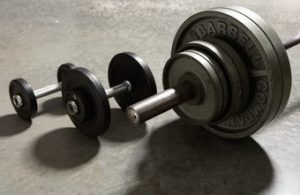A Beginner’s Guide To Bodybuilding
So you’re ready to take the plunge and start a bodybuilding routine. Great! But first there’s a few things you’d do well to take careful note of. First off, bodybuilding is just that … you’re literally trying to build your physique, or at least a better version of the one you have now, and that takes time. It’s a gradual process, and one that takes lots of effort and determination.
 If you start with the idea that you’re going to be a bodybuilding prodigy, and you’re going to see an amazing transformation in a very short time, then you’re kidding yourself, and you’re heading for early disappointment. And it might well be so starkly disappointing that you lose all taste for bodybuilding.
If you start with the idea that you’re going to be a bodybuilding prodigy, and you’re going to see an amazing transformation in a very short time, then you’re kidding yourself, and you’re heading for early disappointment. And it might well be so starkly disappointing that you lose all taste for bodybuilding.
You have to understand that what you’re trying to do is not what your body will be happy to accommodate. Your body is quite content to stay just as it is. Muscle is a very expensive commodity, in terms of energy. Just getting your body to create more muscle tissue goes against nature’s plan; your body does not want to create lots more muscle tissue that will take a huge amount of energy to create and to maintain.
Your body’s main concern, always, is survival, and so it doesn’t want to create a situation where it has to try to maintain what is, in effect, surplus tissue. It just doesn’t need that kind of additional bodyweight. So you have to face the fact that right from day one you will be fighting against your body’s existing blueprint.
“You’re gonna need a bigger boat”
 More muscle tissue means more energy consumption, which means you have to have a bigger and better quality diet. And it means the construction of more capillaries to transport more oxygen-rich blood to that new tissue. From the body’s point of view, that’s just extra work that it doesn’t need, so it will be a challenge to make your body bend to your will.
More muscle tissue means more energy consumption, which means you have to have a bigger and better quality diet. And it means the construction of more capillaries to transport more oxygen-rich blood to that new tissue. From the body’s point of view, that’s just extra work that it doesn’t need, so it will be a challenge to make your body bend to your will.
Also, there’s the matter of your connective tissues. Your joints are constructed with sinews and ligaments to help them move correctly and to facilitate the safe movement of your muscles. All your joints are perfectly capable of handling whatever loads you presently subject them to, but once you start to lift and push significantly higher weights, they have to get stronger and more robust.
And this isn’t something that can happen overnight. Well, strictly speaking it does happen overnight, in the sense that your body recovers from the strain you inflict on it while you’re sleeping, but it isn’t a process that takes place very quickly.
And so to bed …
This takes us to another important factor, and one that beginners, particularly, often don’t pay much attention to – sleep. It’s a common misconception among beginners that muscle building takes place in the gym (or at home, or wherever you train). That’s where you do the work, admittedly, but the actual muscle building doesn’t take place there … it takes place in your bed!
 While you’re training, you’re not building muscle. Quite the opposite, in fact. What you’re doing is straining your muscles, to to point of causing damage (yeah, that’s why it hurts!). You’re putting your muscles under severe and unusual strain to the extent that, if you really push through the pain barrier (which you should be aiming to do), you’ll be causing lots and lots of tiny tears in the muscles, tears that your body will be prompted to repair and in such a way that it can cope with future heavy loads.
While you’re training, you’re not building muscle. Quite the opposite, in fact. What you’re doing is straining your muscles, to to point of causing damage (yeah, that’s why it hurts!). You’re putting your muscles under severe and unusual strain to the extent that, if you really push through the pain barrier (which you should be aiming to do), you’ll be causing lots and lots of tiny tears in the muscles, tears that your body will be prompted to repair and in such a way that it can cope with future heavy loads.
That’s how muscle is built; you train so hard that the muscles are damaged, and then your body goes about its repair work during your sleeping hours, and does all it can to not only repair the damage but in such a way as to make the muscle stronger in order to withstand any future heavy loads you inflict on it.
So as you can appreciate, your sleep is a very important factor in your training regime. It’s at least as important as the other factors, such as the actual training itself, and your diet. Just lifting heavy weights won’t do the trick … you also have to eat a proper diet (in order to supply the nutrients and energy to cope with the training), and you have to have proper sleep (in order to allow your body to fully recover from the damage you caused during training, and to rebuild even bigger and stronger than before).
Ah … so that’s why they call it bodybuilding …

Sorry ... MEMBERS ONLY!
UNLOCK FOR FULL EXERCESS!EXERCESS is an online community of people who want to seriously improve their health and fitness, both mental and physical.
JOIN FREE TODAY!
… and get complete and unfettered access to an absolute goldmine of valuable information.
Already a member? Sign in!
